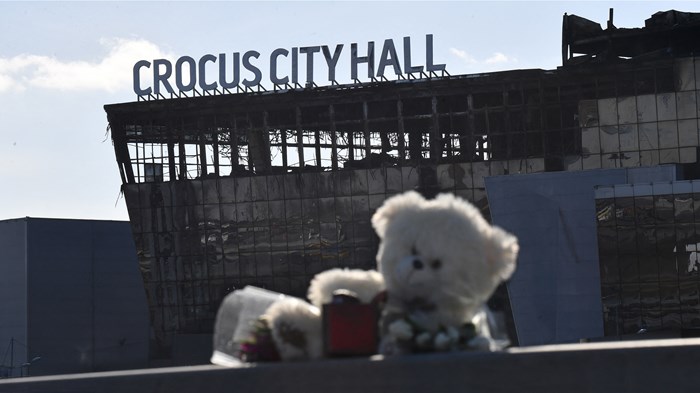
Russian evangelicals used Sunday sermons to condemn a terrorist attack that killed more than 130 people at a Moscow concert hall.
As Russia’s Baptist union prayed for “God’s mercy and protection,” its Pentecostal union conveyed its “bitterness and sorrow.” Vitaly Vlasenko, general secretary of the Russian Evangelical Alliance, called it a “painful shock” that could unleash “unbridled revenge” against terrorism.
But many in Russia are wondering: Who are the terrorists?
The attack on Friday that killed at least 137 people at the 6,200-seat Crocus City Hall was claimed by the ISIS affiliate in Afghanistan’s Khorasan Province (ISIS-K), which seeks an Islamic caliphate in Central Asia. Its statement emphasized it was targeting Christians and came in the “natural framework” of its war against the enemies of Islam.
Earlier this month, the US embassy in Moscow had issued a warning to avoid large gatherings. American officials stated they shared their intelligence with Russia. On March 7, Russia said it thwarted an attack on a synagogue, and a few days prior, security services killed six ISIS-K terrorists during a shootout in the nation’s Muslim Caucasus region.
The group was also linked to the 2017 St. Petersburg metro bombing that killed 15.
ISIS-K was formed by extremists seeking a more violent path than the Pakistani Taliban in 2015, the same year Russia formally intervened in Syria to support President Bashar al-Assad. A Sunni group, ISIS and its affiliates oppose Assad’s Alawite faith as heretical and considers Shiite Muslims as apostate.
In January, ISIS-K killed 95 Iranians in Kerman at a memorial service for Qasem Soleimani, leader of the Islamic Revolutionary Guard Corps who was assassinated by the US in 2020. And as American forces withdrew from Afghanistan in 2021, an ISIS-K attack on the Kabul airport killed 13 US soldiers and 170 civilians.
Analysts stated, however, that ISIS-K was increasingly targeting Russia.
Russia has arrested 11 suspects, with four alleged gunmen from Tajikistan now on trial.
But President Vladimir Putin, reelected March 17 with 88 percent of a vote Western observers declared was neither free nor fair, did not mention Islamic terrorism when he declared a national day of mourning. Official statements of blame have been vague, while the deputy head of Russia’s security council openly speculated that if Ukraine was involved, its leaders “must be tracked down and killed without mercy.”
“Are you sure it’s ISIS?” asked Russia’s foreign ministry spokesperson, suggesting the group was being used as a “bogeyman.” The Russian ambassador to the US denied receiving any advance information from the US. And a nationalist media outlet urged the Kremlin to give Ukrainians 48 hours to evacuate major cities.
Just a few hours prior to the concert hall massacre, in a wide barrage against Ukraine’s civilian infrastructure, Russia had targeted its largest hydroelectric dam, leaving more than one million people without electricity.
Ukraine has denied any involvement in the terrorist attack.
Its military intelligence spokesperson, however, suggested instead that it was a “deliberate act of provocation” by Putin, while President Volodymyr Zelensky stated it was typical of such “thugs” to divert blame. He also alluded to unproven accusations that terrorist attacks in 1999 were a false flag operation, and that Putin considered his own citizens to be “expendables.”
The US stated that ISIS-K alone carried out the attack, with Ukraine uninvolved.
Russian evangelical sources did not comment on the mutual accusations. They emphasized the outpouring of prayer, sympathy for victims, and the need to trust God and resist any urge for revenge.
“Evil is spreading across the earth,” said Alexey Markevich, vice rector for academic affairs for Moscow Theological Seminary, who has criticized the war in Ukraine. “Lord, give us peace, and prevent any of us from being consumed by evil.”
Christians4Peace, an anonymous Russian antiwar group, condemned the near-simultaneous terrorist atrocity and the attack on Ukrainian civilian infrastructure.
“Teach us to love our enemies,” the group posted on its Telegram account. “Show us what we can still do, because we sometimes feel that nothing can be done.”
And a Russian Orthodox leader serving with the Faith2Share network of evangelical agencies, who asked that his full name not be used for security reasons, said the attack was still “too raw” to offer many thoughts. But as he spoke of a sense of “hopelessness,” he also recalled memories of terrorism from the early 2000s. He feared the ISIS links might further harm attitudes toward the Central Asian migrant community from which the alleged attackers hail.
Up to 1.5 million Tajiks have worked in Russia, many with Russian citizenship.
Other Muslim extremists have troubled Russia before. In 2002, ethnic Chechen militants from Russia’s Caucasus region took hostages in a Moscow theater. The security operation to free them resulted in the deaths of 41 terrorists and an additional 129 civilians. In 2004, a siege by Chechen militants at a Russian school in Beslan ended with 330 dead, half of which were students.
But following Friday’s attack, one evangelical leader did not fear escalation.
“We have wise and cautious leadership in Moscow,” said Sergey Holzwert, bishop of the Lutheran church in European Russia. “The government will not be rash and make certain the facts before saying anything official.”
Pavel Kolesnikov, general secretary of the Commonwealth of Evangelical Christians and the Lausanne Movement’s regional director for Eurasia, said the attack was further proof of a broken world. But he discouraged speculation about the culprits.
“It is not our responsibility to assess blame,” he said, citing Proverbs 25:2 and implying that this task belongs to the king. “Evil can come from any place and anyone, and those who want to interpret everything are simply feeding their pride.”
As pastor of Moscow’s Zelenograd Baptist Church, Kolesnikov tackled terrorism in his Sunday sermon.
Sin has reigned since Adam, he said. Too many people idealize the future of the world, thinking they can change it. But though God is on the throne, Jesus commanded Peter to put away his sword. The Sermon on the Mount, he added, sets the Christian focus on a mercy that results in active compassion and forgiveness.
And he noted that David’s prayer was for God to come to his aid.
“If you are in fear, if you demand justice, or if you cannot forgive, come to Jesus,” Kolesnikov preached. “He will give you all you need.”
William Yoder, a retired church journalist and joint US-Russian citizen who has covered the region since 1978, said that Russian evangelicals tend to be more passive than their American counterparts. Living in Russia and Belarus since 2001, he said that none are demanding retribution; instead, terrorism is often seen in the category of natural disasters.
“It is worthy of condemnation,” Yoder said, “but the local attitude is that God must protect us.”
His prayer is that the response will be measured, but he fears escalation. Semi-persuaded that ISIS-K is not to blame, Yoder said most evangelicals would harbor similar doubts, like most Russian citizens. But it would be better if the jihadist group was guilty, lest the enmity with Ukrainians be even further enflamed.
Whoever is behind the attack, he prays that God will speak to their hearts.
Russia claimed that the suspected Tajik militants fled toward Ukraine, where they awaited reception. Russian opposition media outlet Meduza geolocated the arrest to the Bryansk region, 210 miles southwest of Moscow and 90 miles from the Ukrainian border. Pro-Kremlin media broadcast a detained militant’s confession that he was paid by an “Islamic preacher” to carry out the attack.
Analysts have expressed doubt that anyone could infiltrate through the highly militararized border. But two terrorists have pled guilty, though footage also shows them badly bruised.
“There is no religious motivation for this attack,” said Roman Lunkin, head of the Center for Religious Studies at the Russian Academy of Science, conveying the widespread doubt about ISIS-K. “On the contrary, the response has united all religious believers.”
Alongside Christians, Russia’s Muslim, Jewish, and Buddhist organizations have all expressed their condolences to the victims. And as Easter approaches in the West (the Russian Orthodox celebrate on May 5), Kolesnikov reminded believers that Jesus’ blood is our ultimate hope.
Over 5,000 Russians have donated their own to help the wounded, he said, standing in line for nine hours.
“Our job is to be in the community, teaching goodness,” said Kolesnikov. “Christ defeated evil, but though it continues to manifest itself in unexpected ways through individuals, we will not attribute it to any nationality.”

Support Our Work
Subscribe to CT for less than $4.25/month


















